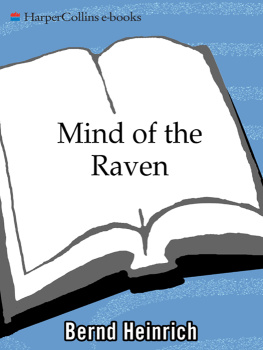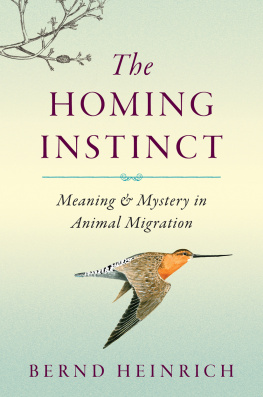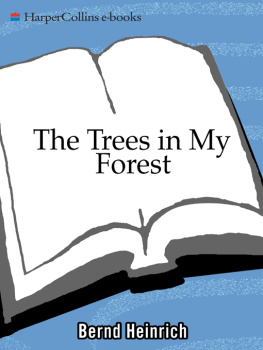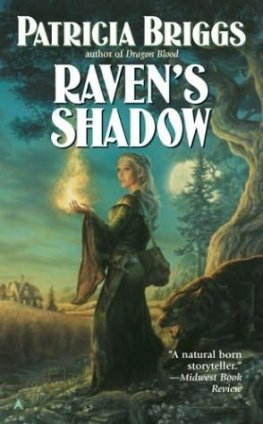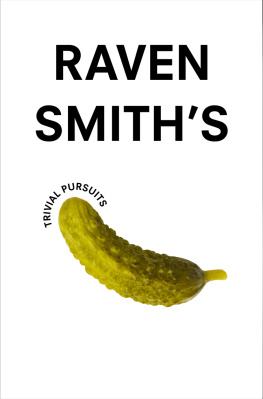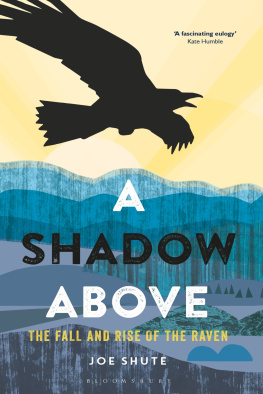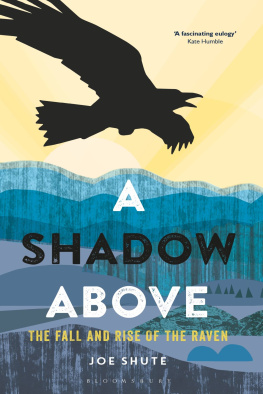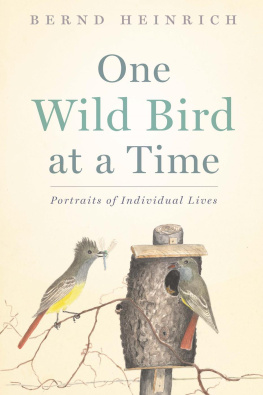This book grew largely out of the generosity of people who have shared their raven experiences and news, offered help and encouragement, and even aided in the field studies. All have helped to greatly enlarge our understanding and appreciation of this magnificent bird. This book is, then, a tribute to the generous input of: Aaron Adams, Bill Adams, Andy Adderman, Phil Angle, Amy Arnett, David Barash, Mark Bekoff, Cindy Bellinger, Trond Berg, Peter Bergstrom, Bill Boarman, Diane Boyd, Jim Brandenberg, George Brady, Cathy Bricker, Neil Buckley, Thomas Bugnyar, Eric Busch, Duane Callahan, David Campbell, Linda Campbell, Geoff Carroll, Rachel Carter, Doug Chadwick, William Chester, Gary Clowers, Craig Comstock, Eileen Connor, Bob Crabtree, Dorothy Crumb, Moria Daley, Mark Damon, Josina Davis, Richard Donley, Bill Drury, Micha Dudek, Randy Durand, Steve Emslie, Adam Farrington, Anell Farris, Gerald Fitz, Lori Friedman, Herbert Fuchs, Jean Craighead George, Ted Gaine, Ron Gerrish, Terry Goodhue, Donald Griffin, Thomas Grnkorn, Tim Hall, Forrest Hammond, Hilmar Hansen, Fred Harrington, Rolf Hauri, Stuart Heinrich, Kay Hensler, Monika Hilker, Carsten Hinnerichs, Garth Holman, Richard Hoppe, Stuart and Mary Houston, Beat Huber, Wendy Howe, Jim Hunter, Inooqi Irguittuq, Fran James, Delia Kaye, Paula Kelly, Bill Kilpatrick, Don Kilpela, Ted Knight, Catherine Koehler, Kurt Kotrchal, Bob Landis, Rachel Lawler, Bob Lawrence, Gale Lawrence, Don Lego, Ted Levin, Matt Libby, David Lidstone, Scott Lindsay, Volker Looft, Barry Lopez, Valerie Lownes, Marcy Mahr, Mary Majka, Marvis Mark, Hans-Dieter Martens, John and Colleen Marzluff, Declan McCabe, Sarah McCracken, John McDonald, Terry McEneaney, Lorin McKay, David Mech, Brad Meiklejohn, Larry Melcher, Randolf Menzel, Gail Mihocko, Michael Miller, John Moran, Klaus Morkramer, Kim Most, Dick Nelson, John and Bob Nicholson, Janet Nook, John and Thomas Nutaraviaq, Abe Okpik, Kristian Omland, Nikita Orsyanikov, Linda Osborne, Tim Osborne, Jane Packard, Mike Palmer, Jack Parriott, Ray Paunovich, Doug Peacock, Hill Penfold, Lyn Peplinski, John Pepper, Mike Peterson, Rolf Peterson, Diane Pickard, Raymond Pierotti, Noah Piugaattuq, Andrea Ramsden, Natalie Rapp, Derek Ratcliffe, Jrg Reimers, Barbara Reif, Cindy Riegel, John Robertson, Ethan Rochmis, Michael Romero, Emanuel Rosen, Barry Rothfuss, Lorenzo Russo, Jenny Ryan, Bob Sam, Akaka Sataa, John Sawyer, George Schaller, Joseph Schall, Doug Schamel, Kristin Schaumburg, Charlie Sewall, Paul Sherman, Lorrell Shields, Phil Silverson, Rick Sinnett, Doug Smith, Roger Smith, John Snell, Ron Spiegel, Dan Stahler, Joanne and Neil Stinneford, Theo Stein, Carl Striedieck, Guy Stevens, Todd Sweberg, Jan Tinbergen, William Townsend, Jeff Turner, Charlie Uttak, Bill Valleau, Johanna Vienneau, Tinker Vitelli, Julia Voge, Wolfe Wagman, Dieter Wallenschlger, Chris Walsh, Mike and Ina Wesno, Steve Wheeler, John Williams, Mary Willson, Lesly Woodroffe, August Wright, Brent Ybarrondo, and Ann Yezerski, and all of those whose names now elude me.
It is impossible for me to single out each for their unique contributions. However, I give thanks to Ted Knight, Delia Kaye, Kristin Schaumburg, and Eileen Connor for freely volunteering months of dedicated labor on an often frustrating radio-tracking project. John and Colleen Marzluff invested three years of hard work, and many great ideas, that were invaluable in securing the recruitment hypothesis. I thank my agent, Sandra Dijkstra, and my editor, Diane Reverand, whose instincts on what constitutes a book have been an invaluable guide. My wife, Rachel Smolker, who gracefully endured my sometimes prolonged absences to be mentally if not physically with the ravens. Rachels fine biological insights and keen editorial comments helped me say what I wanted to convey. Kimberly Layfield transformed my often inscrutable raven-scratch handwriting to type, and always did it with good cheer, and with speed and efficiency. The various institutional, state, and federal agencies expeditiously eased the permit process, and I thank them for thereby acknowledging the value of our gaining intimate contact with our fellow creatures.
My last batch of youngsters, including Red, Blue, Yellow, White, Orange, Green, and Eliot .
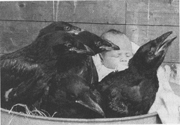
It was better, I decided, for the emissaries returning from the wilderness, even if they were merely descending from a stepladder, to record their marvel not to define its meaning. In that way it would go echoing on through the minds of men, each grasping at that beyond out of which the miracles emerge, and which once defined, ceases to satisfy the human need for symbols .
L OREN E ISELEY ,
The Judgement of the Birds, The Immense Journey , 1946
I HAVE LIVED AND BREATHED RAVENS since a date I will remember: October 29, 1984. On the afternoon of that day, I was drawn to the commotion of a group of ravens at a moose carcass. If even I could be attracted to a carcass from over a mile away, then ravens should be ever more so. The birds seemed to be advertising their find, which meant they would have to share it. I was deeply puzzled by the mystery posed by this phenomenon, and I wrote a book about my efforts to understand it. I was then not aware that the study, and the subsequent ones covered in this book, had been presaged more than two years earlier in a journal entry of mine from February 21, 1981, that described a dream from the night before: I was walking in a dark and very mysterious forest and heard the croaking of ravens, one of the most awesome sounds I know. The ravens calls told me that their nest was near. The ravens calls were full of promise. I felt I was close to something new and exciting, and would find it. Then I awoke. I had always wanted to find the nest of a raven. Was that the focus of its intimate life?
Why would anyone dream about ravens? The common raven, Corvus corax , is the worlds largest crow, usually exceeding goshawks and red-tailed hawks in size. (I will here not use the ornithological convention of capitalizing bird names, adhering to literary usage instead.) It was extremely rare here in northeastern North America fifty years ago, whereas the smaller American crow, Corvus brachyrhynchos , which resembles it superficially, was and still is extremely abundant. Cornell ornithologist and bird artist George Miksch Sutton wrote in 1936 that the raven is wary and solitary in nature. He described it as a bird of the wilderness that few people ever saw, and like most people who know it, he singled it out for being special.
All animals solve the same age-old problems relating to food, partnerships, sex, shelter, home, and caring for their young. Yet ravens have throughout history commonly been singled out to be most like man. Why? What is special about ravens that invites such a comparison?
Humans usually have considered themselves to be different and apart from other animals. Perhaps, as lion researcher Craig Packer points out in his book Into Africa , that is because we make it all up as we go along, whereas an ant has every small instruction laid out in advance. Ravens, like humans and unlike perhaps most other birds, probably do not have instructions to all of lifes problems laid out in advance, or they would not likely have been considered highly intelligent, and mythologized as creators, destroyers, prophets, playful clowns, and tricksters. I have often been startled by their enigmatic and seemingly contradictory responses. But the poetry of biology resides hidden in opposing tensions, and the often arduous fun comes from trying to reveal it.

